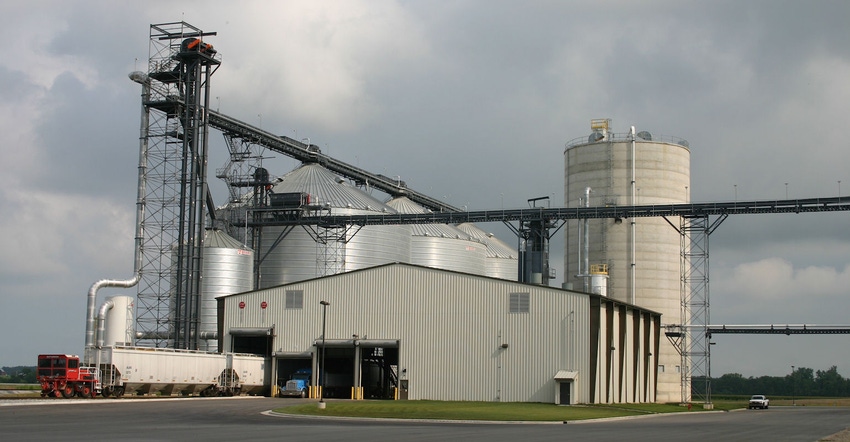POET idles 330mg of ethanol production
Nearly half of America’s biofuel production could soon be offline as fuel demand has fallen by more than half.
April 7, 2020

POET announced April 7 it will idle production at its bioprocessing facilities in Chancellor, S.D., Ashton, Iowa, and Coon Rapids, Iowa,and delay the start-up of its new plant in Shelbyville, Ind., as producers across the United States continue to grapple with the economic fallout of the ongoing COVID-19 pandemic. On an annualized basis, these operational changes are expected to reduce corn demand by 110 million bushels, freezing 330 million gallons of ethanol production across the four facilities. POET has also significantly slowed production at other facilities, further decreasing corn demand.
“Across the board, biofuel producers and our partners in the farm community face an unprecedented challenge,” said POET founder and CEO Jeff Broin. “From day one of this crisis, we have placed the highest priority on protecting the health and welfare of our workers, partners and farm suppliers. At the same time, we are working hard to ensure that every biorefinery remains well-positioned to support a strong and swift recovery once daily life returns to normal. That means responding dynamically to shifting conditions and optimizing production, market by market, as the situation evolves over the next few months.
“Unfortunately, plummeting fuel demand amid the coronavirus pandemic has overwhelmed markets already suffering from continued trade barriers, a foreign price war over oil and regulatory uncertainty here at home. In South Dakota, the crisis has been compounded by one of the worst growing seasons in memory. As a result, POET is taking the difficult step of idling production at our biorefineries in Chancellor, Ashton and Coon Rapids and delaying the start-up of Shelbyville.”
Ethanol producers across the country are slashing production amid the ongoing crisis. Nationally, experts predict a decline in fuel demand of up to 55%. If these conditions persist, it will result in an annualized drop in ethanol demand of up to 8 billion gallons or 2.7 billion bushels of corn.
Growth Energy CEO Emily Skor added, “Biofuel producers and our farm partners are confronting an economic crisis beyond anything rural America has seen before. Fuel demand has cratered, foreign nations have flooded the market with crude oil, and U.S. ethanol producers are bleeding cash after one of the toughest years in memory. In fact, fuel demand has fallen by more than half.”
The list of plants that have cut or halted production continues to grow, with examples across the United States, including California, Iowa, Idaho, Illinois, Indiana, Kansas, Michigan, Minnesota, Nebraska, Ohio, Oregon, and South Dakota. At this rate, nearly half of America’s biofuel production could soon be offline. These plants support hundreds of thousands of jobs, including a highly-skilled manufacturing workforce that rural America cannot afford to lose.
“Protecting these biofuel and farm jobs at the heart of our rural economy will be vital to ensuring that we are positioned to reinvest and rebuild in the months to come. We urge policymakers to act swiftly to expand markets for higher biofuel blends, lift regulatory barriers to vital markets, and ensure that financial assistance is available to farmers, workers, and rural businesses hit hardest by the crisis,” Skor stated in a release.
“As always, we will continue monitoring the situation closely and working with team members at each plant to stay ahead of market changes as the situation continues to evolve day by day,” said POET President and Chief Operating Officer Jeff Lautt. “We remain optimistic that elected leaders will move ahead swiftly on efforts to shore up the rural economy and deliver relief for struggling families. We are fully committed to protecting the strong, stable biofuel markets that America’s farmers need now more than ever, and we look forward to rebuilding and growing America's agricultural markets.”
Here's an interactive map that shows what parts of the Corn Belt are seeing the most negative activity so far compiled by Farm Progress editors:
CCC help
In light of the ongoing situation, Sens. Chuck Grassley (R., Iowa), Tammy Duckworth (D., Ill.), Joni Ernst (R., Iowa) and 12 of their Senate colleagues sent a letter to the U.S. Department of Agriculture (USDA) requesting additional funds be allocated to the biofuel industry through the Commodity Credit Corporation (CCC) during the unprecedented economic circumstances brought on by the COVID-19 pandemic.
“As the country follows the advice of local and state governments and remain at home, motor fuel use has rapidly decreased… The decrease in fuel consumption has left production facilities little choice but to idle production or close completely,” the senators wrote in a letter to USDA Secretary Sonny Perdue.
“Farm income and prices for corn and other crop commodities are directly linked to the health of the renewable fuel industry. Ethanol plants use 40% of all corn grown in the United States. Among other feedstocks, biodiesel and renewable diesel producers currently use over 8 billion pounds of soybean oil a year, creating demand that adds 13% to the cash price of a bushel of soybeans. We have seen a significant drop in the price of corn and soybeans because of the decline in demand.
“Keeping plants open is vital for our states and we ask that you use the authority given by Congress to assist the biofuel industry during extremely difficult times. We are supportive of the proposals the biofuel industry has put forward to reimburse feedstocks and also believe that adding additional CCC funds to the Higher-Blends Infrastructure Incentive Program will drive future biofuel demand,” the senators continued.
The historic Coronavirus Aid, Relief, and Economic Stabilization (CARES) Act provided an additional $14 billion to the CCC to help stabilize, support and protect farm income and prices while also maintaining balanced and adequate supplies of agricultural commodities.
You May Also Like


.png?width=300&auto=webp&quality=80&disable=upscale)
